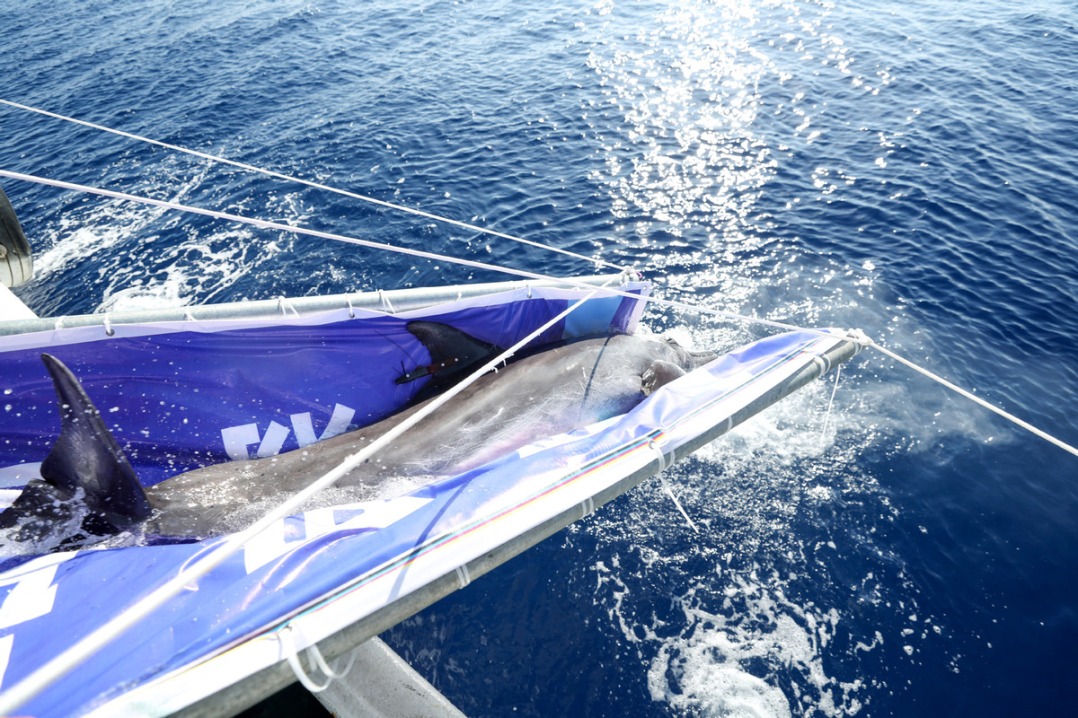Chinese rocket delivers e-commerce packages in sea recovery test

BEIJING -- A Chinese private rocket firm has successfully tested transporting packages from Taobao, one of the country's largest e-commerce platforms, using a reusable rocket. The rocket was later recovered from the sea, marking a significant advancement in commercial space logistics.
SEPOCH, a Beijing-based startup, completed its inaugural "rocket delivery" experiment on May 29 when its XZY-1 verification rocket carried over 20 kilograms of packages during a test flight off China's eastern coast.
The 26.8-meter stainless steel rocket, weighing 57 tonnes, flew for 125 seconds and reached an altitude of 2.5 kilometers before successfully landing vertically on the sea surface near Shandong province.
Following an 18-hour recovery operation, the rocket was retrieved intact and returned to the facility in excellent condition, according to SEPOCH.
The rocket's cargo bay, measuring 120 cubic meters, is designed to carry up to 10 tonnes of goods and could theoretically transport cars and small trucks.
The experimental cargo in the recent testing launch included items from two Taobao marketplace stores, including products from the National Library's official flagship store, as well as commemorative postcards created specifically for the test.
"Package delivered, please check!" SEPOCH founder Wei Yi messaged friends immediately after the test. "The experimental parameters show that the express delivery warehouse meets the expected standards in fire resistance, moisture resistance and shock absorption," he added.
The rocket company's collaboration with Alibaba's Taobao signified China's exploration into the burgeoning field of point-to-point rocket transport. This technology promises to revolutionize global logistics by reducing intercontinental delivery times from days to minutes.
Wei admitted that the current costs are still too high for regular consumer deliveries, and the initial applications will focus on emergency deliveries, disaster relief and supplying remote areas.
"With the routine use of reusable rockets and the engineering application of stainless steel, rocket delivery costs are expected to drop significantly," said Wei.
Aerospace expert Cao Meng said that rocket delivery is a long-term plan, though it could one day enable true global "flash delivery."
"It needs multiple tests to verify the reusable rocket recovery technology and the rocket body's strength and durability," said Cao.
After the sea recovery, the XYZ-1 stainless steel rocket body showed no signs of damage or leakage, and the engines and electrical products in the tail compartment were in good condition, according to SEPOCH.
The rocket company said it is capable of implementing its first orbital flight and recovery mission by the end of 2025. The rocket is designed to deliver goods weighing seven tonnes to a 1,100-kilometer orbit using liquid oxygen and methane propulsion.
Next, the rocket's delivery warehouse layout will be optimized, allowing the types of goods transported to be expanded to include fresh produce and fragile items. Also, an escape system will be developed to ensure cargo safety.
- Chinese rocket delivers e-commerce packages in sea recovery test
- Man carries his daughter through 12 years of school to gaokao
- China's dinosaur world unveils prehistoric legacy
- Beijing airports see surging tax refunds for overseas travelers
- Largest cross-Strait grassroots exchange event to be held in Fujian
- China launches South China Sea tsunami advisory center in Hainan





































